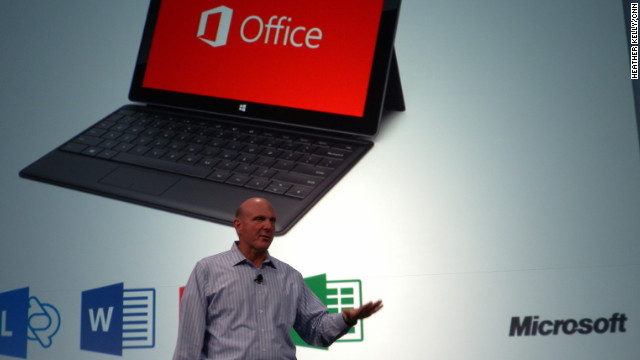
For Microsoft's latest version of its Office suite, the company is betting big that making documents accessible across multiple devices, a cleaned-up design and improved collaboration features will keep the product relevant to today's users.
Microsoft announced the Windows 8-friendly products, Office 13 and Office 365, at a press event on Monday. It's a major overhaul meant to help it fight a shrinking PC market, free Web-based competitors and consumer influence in corporate IT departments.
"In a sense, it feels to us a lot like 1995," said an excited Steve Ballmer, Microsoft CEO, at the event. The nostalgia might be for the year Internet Explorer made its public debut, but the much-repeated theme of the new version of Office is that it's the "modern Office."
Office reigns as Microsoft's most lucrative product and maintains a 90% market share of PCs, according to research firm Gartner. But recent years have seen a slew of inexpensive and free competitors nipping at its heels -- most notably Google Apps, a cloud-based suite of software for word processing, spreadsheets, presentations and e-mail.
The Google tools lack some of the features found in Microsoft Office, but to many users that simplicity is part of their appeal.
"Keeping the market is always a challenge, especially when you're competing against free or cheap, but Microsoft has been competing against cheaper and free suites for more than a decade and continues to do pretty well," said Gartner analyst Michael Silver.
Microsoft is still taking Google's encroachment seriously and has even created a special "Google Compete" team to prevent corporate Office users from making the jump to Google Apps,according to The Wall Street Journal.
In addition to preventing users from switching to other products, Microsoft must persuade them to upgrade from older versions of Office. In the past, a confusing design change or dropped support for plug-ins has been reason enough for users to skip the upgrade and stick with the version they're comfortable with. Turnaround time can also be slow at large companies, where upgrading everyone is a costly and complicated undertaking.
"Organizations are still deploying Windows 7 and Office 2010, and because of the urgency in getting Windows XP out by April 2014 when support ends, both Office 2013 and Windows 8 will likely have to take a back seat for a while," said Silver.While large corporations are slow to roll out new versions of software, there has been a recent shift in how they adopt technology. More and more, consumer technology is coming in the front door of businesses, being championed by the people who have to use it rather than the IT department.
A bring-your-own-device trend was started by executives unwilling to leave their beloved iPhones at home, forcing companies to adapt quickly. The proliferation of free Google e-mail accounts led to casual users switching to Google Docs, and eventually pushing their employers to switch to Google Apps.
Most of Monday's Office demonstration was done on touchscreen devices -- a tablet as well as a massive 82-inch multitouch HD display connected to a Windows 8 PC. Expanding Office to tablets might be necessary for growth.The PC market has been struggling, with shipments of the desktop and laptop computers falling .1% worldwide this past quarter compared to the same period last year.
The smartphones and tablets are second and third devices, but users want to be able to work effectively from all of them and that requires cloud-based software. So for the time being, Office must straddle two worlds so as not to lose customers.
"You can still buy software and install it," said Ballmer. "That's not going away, at least certainly not at this stage in the game."
Full News...
No comments:
Post a Comment